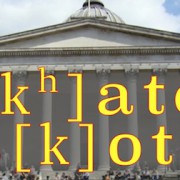Unaspirated Scott
 Day 7 of the UCL Summer Course in English Phonetics brings the first of our lectures on intonational meaning from Kate Scott of Kingston University. Both of Kate’s names contain voiceless velar plosives, but they’re interestingly different. We’ve seen already that the sounds /p t k/ are aspirated at the beginning of a word or stressed syllable, as in [kʰ]ate:
Day 7 of the UCL Summer Course in English Phonetics brings the first of our lectures on intonational meaning from Kate Scott of Kingston University. Both of Kate’s names contain voiceless velar plosives, but they’re interestingly different. We’ve seen already that the sounds /p t k/ are aspirated at the beginning of a word or stressed syllable, as in [kʰ]ate:
But this doesn’t happen if the plosive is immediately preceded by /s/ in the same word or syllable, as in Scott:
In fact, the resulting unaspirated plosive sounds very like English /g/, so that this name sounds more like /s/ + got than like /s/ + cot. Here is Scott again, followed by the same recording but with a gap inserted between the /s/ and the rest:
This comes as something of a shock to many people. But for confirmation, here is the word speech from both the Oxford and Cambridge online dictionaries, followed by the same recordings with /s/ removed – which sounds like beach:
You might wonder why dictionaries don’t transcribe words like Scott and speech as /sgɒt/ and /sbiːtʃ/ rather than /skɒt/ and /spiːtʃ/. This is a possibility in theory, but in practice would lead some non-natives into pronunciations with too much voicing. As things stand, many non-natives who have learned to aspirate the initial plosives in words like cot and peach carry this over into words like Scott and speech, resulting in non-native pronunciations like [skʰ]ott:
So, if you’ve been pronouncing SCEP with aspiration, as [skʰ]EP, try saying it without!
SCEPlog 1 Postalveolar Jane SCEPlog 2 Aspirational Paul
SCEPlog 3 Sam /v/ictor /w/ood SCEPlog 4 Bob Ladd
SCEPlog 5 Non-rhotic Margaret SCEPlog 6 Devoiced Cris
SCEPlog 7 Unaspirated Scott SCEPlog 8 ‘ng’ as in Inger & Young Shin

